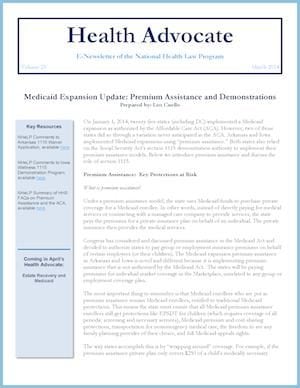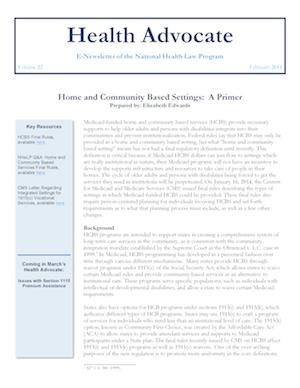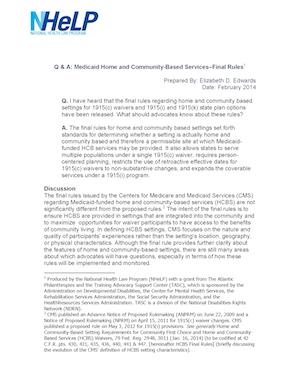
Section 1115 Medicaid waivers allow states to explore new options for providing health coverage to persons who would otherwise not be eligible and allow states to examine innovative ways to deliver care by waiving certain requirements of the Medicaid Act.
While waivers can be important tools that can help states respond to the needs of low-income individuals, they also present concerns for health advocates working to protect the rights of Medicaid enrollees and promote transparency in state waiver processes.
Sec. 1115 of the Social Security Act allows the Secretary of Health and Human Services to waive some requirements of the Medicaid Act so that states can test novel approaches to improving medical assistance for low-income people.
Under the current administration, several states are seeking waivers to impose harmful cuts and restrictions. The first set of harmful waivers have been approved for Kentucky and Arkansas, with a number of states seeking to enact similar changes to Medicaid. Learn more about Medicaid waivers and how the National Health Law Program is combating the Trump administration’s illegal use of waivers to weaken Medicaid.
View 1115 Waiver Resources By State
- Show all
- Abigail Coursolle
- Alejandra Pavisich
- Alejandra Pavisich
- Alexis Robles-Fradet
- Alicia Emanuel
- Amanda Avery
- Amy Chen
- Andy DiAntonio
- Arielle Linsey
- Brian Brooks
- Candace Gibson
- Carly Myers
- Cassandra LaRose
- Cat Duffy
- Catherine McKee
- Cathren Cohen
- Charlie Blodnieks
- Charly Gilfoil
- Christina Piecora
- Corey Davis
- Dania Douglas
- Daniel Young
- daryln
- David Machledt
- Deanna Hartog
- Elizabeth Edwards
- Elizabeth G. Taylor
- Emma Parker-Newton
- Eskedar Girmash
- Fabiola Carrión
- Georgesula Ziama
- Geron Gadd
- Hannah Eichner
- Hayley Penan
- Héctor Hernández-Delgado
- Ian McDonald
- Jane Perkins
- Jasmine Young
- Jennifer Lav
- Joe McLean
- Kally Xu
- Kasey Nichols
- Kimberly Lewis
- Leonardo Cuello
- Lisa Munoz
- Liz McCaman Taylor
- Madeline Morcelle
- Mara Youdelman
- Margaret Okakpu
- Maya Levin
- Michelle Lilienfeld
- Michelle Yiu
- Miriam Delaney Heard
- Mizue Suito
- Priscilla Huang
- Rachel Holtzman
- Rolonda Donelson
- Sarah Grusin
- Sarah Somers
- Skyler Rosellini
- Susan Berke Fogel
- T. Nancy Lam
- Wayne Turner
- Zamir M. Brown
- Show all
- Alabama
- Alaska
- All United States
- Arizona
- Arkansas
- California
- Colorado
- Connecticut
- Delaware
- District of Columbia
- Florida
- Georgia
- Hawaii
- Idaho
- Illinois
- Indiana
- Iowa
- Kansas
- Kentucky
- Louisiana
- Maine
- Maryland
- Massachusetts
- Michigan
- Minnesota
- Mississippi
- Missouri
- Montana
- National
- Nebraska
- Nevada
- New Hampshire
- New Jersey
- New Mexico
- New York
- North Carolina
- North Dakota
- Ohio
- Oklahoma
- Oregon
- Pennsylvania
- Rhode Island
- South Carolina
- South Dakota
- Tennessee
- Texas
- Utah
- Vermont
- Virginia
- Washington
- West Virginia
- Wisconsin
- Wyoming
 March 18, 2014
March 18, 2014Health Advocate: Medicaid Expansion and Premium Assistance
This issue of the Health Advocate covers how states are implementing the Medicaid expansion authorized by the ACA using premium assistance.
 February 18, 2014
February 18, 2014Health Advocate: Home and Community Based Settings — A Primer
This issue of the Health Advocate provides an overview of Medicaid Home and Community Based Services (HCBS). HCBS programs are intended to support states in creating a comprehensive system of long-term care services in the community, as is consistent with the community integration mandate established by the Supreme Court in the Olmstead v. L.C. case in 1999.
 February 11, 2014
February 11, 2014Q&A: Home and Community-Based Services-Final Rules
Q&A: Home and Community-Based Services-Final RulesMedicaid-funded home and community-based services are critical to community integration for older adults and individuals with disabilities. Defining the types of settings in which these services are provided is important in ensuring the services are not provided in settings that are institutional in nature, but instead promote access to the community. This Q&A discusses the new rules, the definition of home and community-based settings, the transition process, advocacy opportunities, and other new features for Medicaid waivers and programs under these new rules.
- August 29, 2013
Webinar: Medicaid Cost-Sharing
National Health Law Program Legal Director Jane Perkins and Senior Policy Analyst David Machledt discuss cost-sharing, the portions of medical bills that are payed by the enrollee, and premiums in the context of Medicaid. This webinar covers the relative impacts of cost-sharing and premiums on access to care at different income levels, the legal requirements that limit Medicaid cost-sharing, the important litigation on Medicaid cost-sharing at the time of recording (including Section 1115 Demonstration cases), and tips for advocates working in this policy area. Download the slides from this presentation here. Note: This is Part II of our two-part series on Medicaid Eligibility Regulations. View Part I, "Medicaid Alternative Benefits Plans," here.
- July 23, 2013
Q&A – Early MAGI Implementation
To help facilitate the transition to MAGI, CMS recently issued guidance allowing states to implement MAGI on October 1, 2013, coinciding with the beginning of open enrollment in the new health insurance marketplaces (exchanges).The following Q & A addresses questions and concerns regarding the early implementation of MAGI, including how to best protect current enrollees.
- July 23, 2013
NHeLP Letter to Cindy Mann on Partial Medicaid Expansion
After the Supreme Court rules that HHS could not enforce penalties on states if they refused the adult Medicaid expansion, several states showed interest in using generous federal matching funds to partially expand their adult coverage. This letter to Cindy Mann presents legal analysis supporting NHeLP's recommendation that CMS not allow states to partially expand Medicaid.
- July 23, 2013
Limiting Cost-Sharing in Medicaid Funded Programs
Q. My state is considering implementing cost sharing for Medicaid beneficiaries, arguing that this will save money. The state wants to implement cost sharing above the nominal amounts listed in federal Medicaid regulations and to make payment of the copayments mandatory. It also wants to impose premiums on some Medicaid populations that exceed the premium amounts currently allowed in the Medicaid laws. We understand that the state is going to ask the federal Medicaid agency for approval of these changes. Are there arguments we can make against these cuts? Can you suggest evidentiary support for our legal position? A. Yes. A recent decision from the Ninth Circuit Court of Appeals casts doubt on the state?s plan to impose the heightened cost sharing. Moreover, numerous studies have demonstrated that Medicaid cost sharing reduces utilization of necessary services and lowers enrollment. The imposition of premiums also implicates the maintenance of efforts requirements of the Affordable Care Act. Discussion Medicaid cost sharing rules Cost sharing requires a patient to pay part of the cost of health care services, such as enrollment fees, premiums, deductibles, coinsurance, copayments, or similar charges. Congress has been very…
- July 23, 2013
Covering HCB Services through the 1915(i) State Plan Option
Q. My state is considering asking CMS to approve Medicaid coverage of home and community-based (HCB) services through the 1915(i) state plan option. Can you explain what this option is and whether there are any particular issues that advocates should watch for? A. Section 1915(i) enables to states to offer HCB services through a state plan option. This can be good for P & A clients, because it can increase access to HCB services for individuals who are not eligible for Medicaid waiver programs. At the same time, it can be a way for states to limit coverage of services to particular populations. Therefore, advocates need to closely monitor states? plans to offer 1915(i) services. Discussion In 2005, Congress added a new section to the Medicaid Act that authorizes states to provide HCB services to certain individuals through a state plan option.2 Previously, such home and community-based services could be offered only pursuant to an 1115 or 1915 waiver.3 The 1915(i) option enables states to serve individuals with incomes under 150% of FPL who need HCB supportive services but whose disabilities are less severe than those served under HCB waivers. Unlike waivers, individuals…
- July 23, 2013
NHeLP Comments: Medicaid Program; State Plan Home and Community-Based Services, 5-Year Period for Waivers, Provider Payment Reassignment, and Setting Requirements for Community First Choice
Comment letter to CMS on home and community-based services (HCBS) emphasis the promotion of self-directed HCBS, person-centered services and transparency and monitoring for HCBS programmatic standards.
- July 23, 2013
Q & A: Recent Settlements in Medicaid Home and Community-Based Waiver Cases
Q & A: Recent Medicaid Settlements in Washington and Florida On December 20, 2006, the Federal District Court for the Western District of Washington gave final approval to a far-reaching settlement agreement in a Medicaid home and community based waiver case. Boyle v. Braddock was filed in 2001 on behalf of a class of current and future participants in Washington?s Medicaid Home and Community Based Waiver programs for people with developmental disabilities. The plaintiffs claimed that Washington?s Division of Developmental Disabilities (DD) had violated Medicaid law by failing to advise waiver participants about the range of Medicaid services available; failing to provide services with reasonable promptness and denying waiver participants free choice of service alternatives available under the waiver. In addition, the plaintiffs claimed that they were not given due process when services were reduced, terminated or denied. After several years of litigation, extensive discovery, appeal to the Ninth Circuit, and two separate formal mediation processes, the parties entered into the settlement agreement that was ultimately approved by the district court. The settlement provides that: All waiver participants will have annual comprehensive needs assessments; All waiver participants will have the opportunity to apply…



